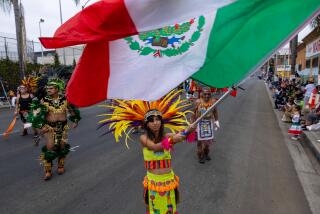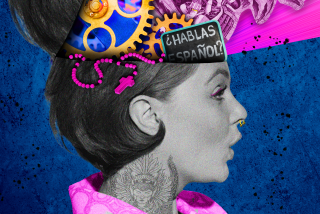A Need to Re-Evaluate Latino Relationship With Mother Spain
- Share via
On Oct. 12 we celebrate the anniversary of the discovery of America in 1492. This historic event means different things to various people.
Most people of European background look at the discovery of America as a great step forward in the march of Western civilization. For them, Oct. 12 is the familiar Columbus Day.
But since history is often the account of the victor, we must recognize that some Americans of today still have mixed feelings about Oct. 12, 1492. American Indians from Patagonia northward have mixed feelings about the arrival of their conquerors. Africans who were brought over as slaves no doubt also had mixed feelings.
Dia de la Raza is celebrated on Oct. 12 in all the Hispanic nations of the American continents and in Spain. It celebrates the formation of a new “race” of Americans, mestizos who are the offspring of Spanish and American Indian parents. The holiday marks the beginnings of Hispanic Americans.
Many Mexican-Americans in the United States still have some anti-Spanish sentiments derived from the distorted versions of history gained in U.S. schools and celebrations of the 16th of September, which marks Mexico’s declaration of independence from Spain in 1810.
Just as England nurtured and shaped U.S. values, so too did Spain from the Caribbean to the Philippines. Spain sent teachers, craftsmen, the printing press, founders of universities and missionaries throughout the continent all the way to California. It sent far more than conquistadores, but many Latinos ignore this because so much of the little history they know has been colored by England’s prejudice against Spain.
In the mid-19th Century, the United States went to war against Mexico and at the turn of the century Spain as well. In more recent decades, films and TV have joined books and schools in depicting everything Hispanic or Catholic as corrupt or backward.
In time Americans took a second look at England and gradually replaced resentment with a new bilateral relationship based on a better understanding. This “special relationship,” as it is called, affects global affairs. I believe it is time for all Hispanic Americans to review their feelings about the mother country they hold in common.
Spain of today bears no guilt for abuses committed by ancestors 500 years ago. It wants to help shape a new era of brotherhood with all Spanish-speaking peoples. Winston Churchill in his great work, “A History of the English-Speaking Peoples,” stated that language and related values bind these people together, regardless of nationality.
The Spanish anthropologist, Jose Antonio Jauregui, states in his famous book, “The Rules of the Game,” that language and shared values define a tribe. Sentiments of tribal membership transcend patriotism in some respect.
When in 1987 the Spanish king and queen visited cities of the Southwest that were established by former subjects, they signaled the desire to draw closer together with Americans of Hispanic descent. Actually, this drawing together was initiated by Mexico and some Chicano leaders in the 1960s. El Acercamiento, as this drawing together is called, is really no different than the efforts of groups like Irish, German or Jewish Americans to maintain their cultural heritage and links with the land of their ancestors.
As the numbers of all Latinos in the United States increases, so too will the importance of a drawing together of Hispanics with Spain as well as Mexico.
In 1992 we will commemorate the 500th anniversary of the discovery of America. How all Latinos celebrate this great event will be for us to define. Spain has set a healthy tone by calling it the “Encounter of Two Worlds,” rather than the “discovery” of America.
More to Read
Sign up for Essential California
The most important California stories and recommendations in your inbox every morning.
You may occasionally receive promotional content from the Los Angeles Times.













